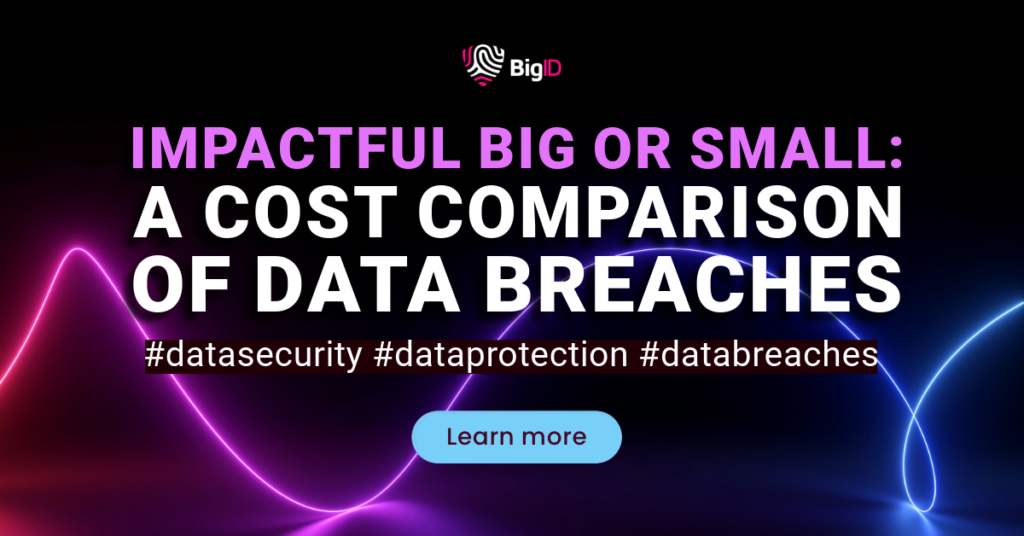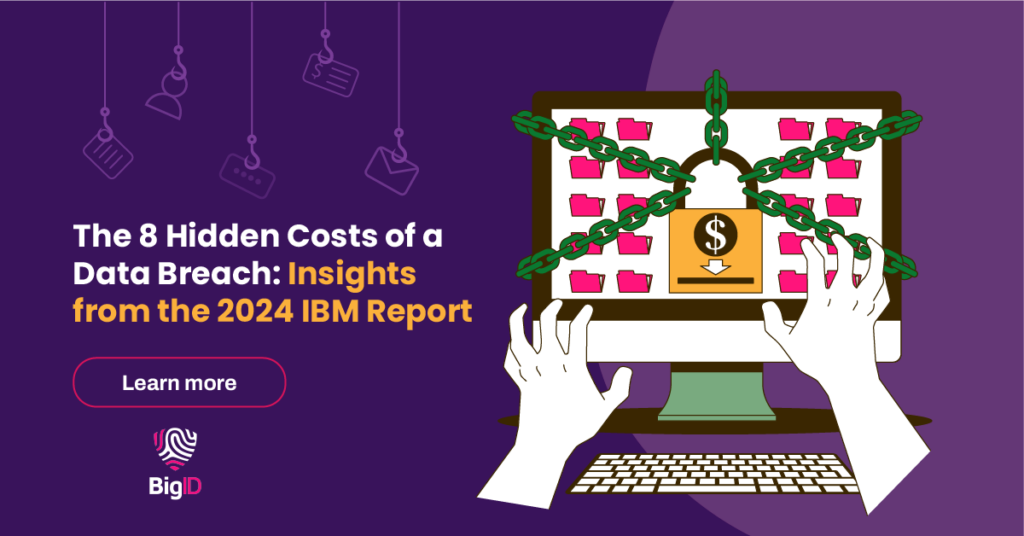Now more than ever, data breaches have become an unfortunate reality for organizations of all sizes. However, the impact of a breach is not felt equally across the board. Small businesses and large enterprises face vastly different challenges when it comes to the financial, operational, and reputational fallout of a cyber incident.
Let’s dive into the key differences and explore how innovative solutions like BigID can help mitigate these risks.
The Cost of a Data Breach: Small Businesses vs. Big Businesses
While big businesses often make headlines when they suffer a breach, small businesses are far from immune. In fact, the impact on smaller organizations can be disproportionately devastating.
- Small Businesses: According to the National Cybersecurity Institute 50% percent of small to medium-sized businesses (SMB) experience a cyber attack and over 60% of those attacked go out of business.
According to Verizon’s 2024 Data Breach Investigations Report, the average cost of a breach for a small business ranges from $120,000 to $1.24 million, depending on the severity. For many small businesses, this is a financial burden they simply cannot recover from.
- Big Businesses: In contrast, IBM reports large enterprises face higher absolute costs—averaging $4.88 million per breach in 2024—but these costs represent a smaller percentage of their overall revenue. Big businesses also have the resources to invest in robust incident response plans, which can help mitigate long-term damage.
The disparity highlights a critical point: while big businesses can absorb the financial hit, small businesses often lack the resources to recover, making them a prime target for cybercriminals.
Areas of Impact: Where the Pain is Felt
The fallout from a data breach extends far beyond immediate financial losses. Here’s how small and big businesses are affected differently across key areas:
1. Financial Impact:
- Small businesses often operate on tight margins, meaning even a relatively small breach can cripple their cash flow.
- Big businesses, while facing higher absolute costs, can often offset these expenses through insurance, reserves, or revenue diversification.
2. Reputational Damage:
- For small businesses, customer trust is hard-won and easily lost. A breach can tarnish their reputation irreparably, leading to a loss of clientele.
- Big businesses, though not immune to reputational harm, often have brand loyalty and marketing budgets to help rebuild trust over time.
3. Regulatory and Compliance Costs:
- Small businesses may struggle to navigate complex compliance requirements, leading to hefty fines and legal fees.
- Big businesses typically have dedicated legal and compliance teams to manage these challenges, though the fines can still be substantial.
4. Operational Disruption:
- Small businesses often lack the IT infrastructure to quickly recover from a breach, leading to prolonged downtime.
- Big businesses can leverage their scale and resources to minimize downtime and maintain business continuity.
How BigID Helps Mitigate Security and Risk
Regardless of size, prevention is always better than cure when it comes to data breaches. BigID’s industry leading platform for data security, privacy, compliance, and AI empowers organizations to proactively identify, classify, and protect their sensitive data, reducing the risk of a breach. Whether you’re a small business or a global enterprise, BigID scales right alongside your needs.
With BigID, organizations get:
- Data Discovery and Classification: Automatically classify, categorize, tag, and label sensitive data with unmatched accuracy, granularity, and scale.
- Improve Data Security Posture: Proactively prioritize and target data risks, expedite SecOps, and automate DSPM.
- Enable Zero Trust: Reduce overprivileged access & overexposed data, and streamline access rights management to enable zero trust.
- Streamlined Data Lifecycle Management: Apply a policy-based approach to automate data lifecycle management across collection, retention, and deletion.
- Breach Impact Analysis & Reporting: Identify affected individuals and generate regulator-ready reports to minimize financial and legal fallout.
See how BigID can help your organization mitigate risk and prevent data breaches — book a 1:1 demo with our security experts today.



